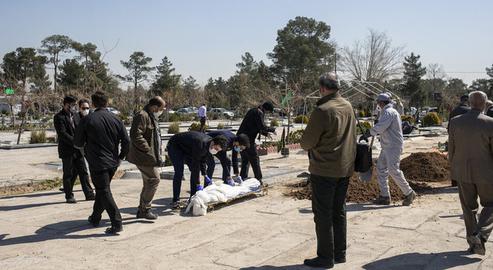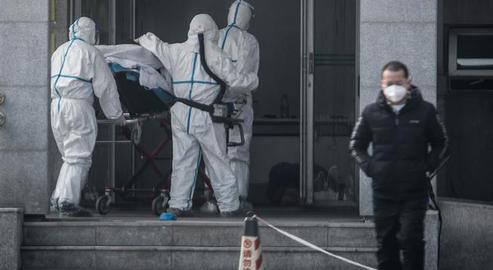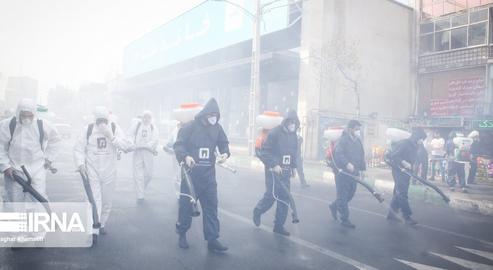The family of a coronavirus disease victim has been threatened by security services if they talk about their loved ones contracting COVID-19 – with agents saying they would not deliver the corpse of their loved one. Below is the narrative of Sadeq, mourning the death of his mother-in-law, and who is concerned about the health of himself and his family.
When the November 2019 massacre occurred and hundreds of protesters were shot dead in the streets of Iran, families were pressured by security forces to remain silent. Mourning ceremonies were held in secret and at night. Strange conditions were imposed for the delivery of the remains of killed Iranians to their families – from burial in remote areas to paying large sums of money to receive the remains.
When Ukrainian Airlines Flight 752 was shot down by Revolutionary Guards missiles in Iranian airspace, in January, and its 176 passengers were killed in the explosion between the ground and the sky, the reaction of the ruling system was similar; threats, intimidation, encouraging people to keep silent, and "martyr-creating."
Confiscating bodies and forcing families to toe the security services’ line were common practice. Those who refused were threatened with arrest.
The new coronavirus crisis in Iran has prompted security services to behave in a similar way. Several families who have lost loved ones as a result of the outbreak complained to IranWire of pressure from security forces and threats being made to families when bodies were being returned to families and even during funerals.
"My mother-in-law had a cold two weeks ago. We took her to the hospital; they said nothing was wrong with her and that she must rest at home. She had a dry cough. She had an olfactory disorder as well. Three days ago she became very ill. She had shortness of breath and coughed terribly. Before we called the emergency services, she died, all within 10 minutes. Even though the emergency doctor had said she was suspected of having the coronavirus, they did not test her and recorded the cause of death as cardiac arrest in her death certificate."
This is Sadeq’s story, a Tehran resident whose family has been wounded but has had no opportunity to mourn. They are worried they may be infected with the coronavirus by their mother-in-law who contracted the disease.
"Because they said my mother-in-law did not have COVID-19, my family and my brother-in-law were in contact with her," he told IranWire. "My wife's mother was a fit woman and needed no one to do her job. But since she lived alone, we would visit her in turn. Three days before she became ill, my wife and my 17-year-old son had done some shopping for her. My wife had cooked food and we all went to pack the food we had bought and also to visit her. This was when her condition deteriorated."
Sadeq says his mother-in-law had a cough and shortness of breath and it happened so suddenly that they did not get a chance to ask her if she had a problem during the day.
"She started coughing and her breathing stopped,” Sadeq says. “Previously when we went to the hospital with my brother-in-law, they had not taken any tests or x-rays, just a usual examination. They said she had no problem and if she had pain or a fever, she should take acetaminophen and rest."
But in addition to the sadness of losing their mother-in-law, they have new problems.
"When the death certificate was issued, my brother-in-law begged them to check whether his mother died from coronavirus,” Sadeg said, “to bury her in accordance with proper protocols. But they said they could not test her because the test was for those who were alive. They said that if we have a grave in Behesht-e Zahra Cemetery, only two of the family should bury the body without the presence of others; and if we did not, we should go and prepare a grave and then go back."
When he and his brother-in-law went to get the body, Sadeq says, their cell phones were seized by two people who gave them a written pledge to sign.
“They said we should not mention coronavirus at all, or otherwise they would not give us the corpse,” Sadeq says. “They also seized our cell phones so that we would not film the funeral. My father-in-law died three years ago and they had a two-storey tomb in Behesht-e Zahra Cemetery. They said they were going to bury her there. Burial was also done by Behesht-e Zahra agents in special clothing, but she was buried as a normal case. But they told us not to go to the grave for 72 hours.”
Instead of managing the crisis, he believes, the government is further promoting it.
“Hiding coronavirus death statistics only makes things worse,” Sadeq says. “They stated the reason for my mother-in-law's death was cardiac arrest. You cannot imagine how many bodies were there. Many were like us. God bless them, they were buried as normal and without any safety measures. My family and my brother-in-law and I were neither tested nor quarantined. We have quarantined ourselves [voluntarily] and we are praying that we will not become infected or pass it to anyone. Many don't even do that. Many are unwittingly in line with the government. Hiding this matter only leads to more deaths.”
Ameneh-Sadat Zabihpour – a correspondent for Islamic Republic of Iran Broadcasting (IRIB), previously suspected of collaborating with security agencies by some detained activists – has now produced a report to coerce families and to question officials who have tried to report the critical coronavirus situation in Iran’s provinces involved. Zabihpour has accused these officials of providing false statistics and questioning the information provided by them.
Zabihpour pointed to a tweet by the member of parliament Gholamali Jafarzadeh Imanabadi regarding the death of at least 200 people in Gilan as a result of the coronavirus, as well as a video released by a Rasht city council member about corpses piling up in cemeteries, saying: "The statistics provided by [them] cause terror among the people."
The report also cites videos of people with coronavirus and doctors and nurses who say hospital services are struggling as the cause of "pumping terror and fear into the hearts of the people.”
Masoud is a professor at Hamedan University of Medical Sciences. He told IranWire: "Yesterday I went to the Bagh-e Behesht cemetery for the funeral of a friend who had died in an accident. The burial officers said they were bringing in people who had died of acute respiratory infection, stroke, and acute pulmonary problems, and we were told to do a normal burial. But this number of deaths seems abnormal. They are probably victims of the coronavirus."
According to Massoud, officials working in the cemetery’s morgue have been threatened by security agencies not to refrain from washing bodies and carrying on with burials.
"I did not believe it and did some research about it,” Massoud said. “Unfortunately, that was true. Both the medical staff and the grave diggers have been pressured not to announce the true cause of death of those who died of the coronavirus disease. Forensic doctors have also been told to indicate the cause of death as lungs problem, acute lung infection, or shortness of breath in the death certificate of those who did not have a coronavirus test but died of COVID-19 symptoms."
This citizen of Hamedan, surprised by the cooperation of some families with the security agencies, said: "It is very strange that citizens are willing to hide the real cause of death. It looks like they have no problem with concealing this situation. They do not realize that burying these victims without protective measures puts all citizens at risk. I wish officials, doctors, relatives and families were not afraid of threats and did not gamble on their health and their families' health."
IranWire had earlier said in a report that some nurses and doctors in Gilan hospitals had been threatened with dismissal for protesting about the lack of safety facilities. The threats now appear to have become wider, and the physicians and families of the victims who pursue the cause of death or announce the true cause of their patient's death have been put under pressure.
visit the accountability section
In this section of Iran Wire, you can contact the officials and launch your campaign for various problems


























comments